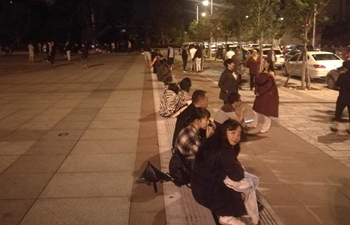by Anna Strumpel and Philipp Requat
BERLIN, Aug. 13 (Xinhua) -- When more than a million asylum seekers arrived in Germany in 2015, the country's initial reaction was summed up by its veteran chancellor Angela Merkel in three words: "We can do it!" And Merkel reiterated whenever questioned about the challenges that the influx of refugees would create.
Three years later, Merkel's fourth governing cabinet has moved away from what became known as the "open door policy" in September 2015. The federal government has now swerved decisively to the right on migration, a move that was underscored by a recent compromise reached to resolve bitter infighting over asylum policy between the Christian Democratic Union (CDU) and its Christian Social Union (CSU) conservative sister party and coalition partner.
CDU-CSU SPAT OVER ASYLUM POLICY
Following the publication of his ambitiously-named "migration master plan" in June, interior minister and CSU leader Horst Seehofer threatened to resign unless Merkel endorsed the complete document or found a comparable solution on a European level within the course of two weeks. Most controversially, Seehofer wanted to refuse asylum access to German territory if migrants had formally entered the Schengen zone via another country.
The ultimatum imposed by Seehofer on the chancellor marked a historically unprecedented show of cabinet disobedience in Germany, which threatened to unravel the entire ruling grand coalition.
At least initially, Merkel was critical of the "migration master plan." She warned of a potential domino effect in the European free travel area caused by its unilateral border control provisions, as neighboring states rush to shutter their internal Schengen borders in response.
Yet instead of sacking the rebellious minister, the chancellor hurried to a meeting in Brussels, where she managed to secure a vague agreement from Germany's European partners to toughen and expand their joint asylum policies. Upon return to Berlin, she then struck a deal with Seehofer to resolve the CDU-CSU spat by establishing "transit centers" on German-Austrian borders, where asylum seekers who are already registered in the European Union (EU) will be detained before being transferred on to the responsible member state.
The outcome raised eyebrows in European capitals, with many observers arguing that the negotiated agreement was much closer to Seehofer's "master plan" for a strict and national asylum regime than Merkel's vision of European solidarity around the issue.
HARDENING STANCE ON MIGRATION
The hardening of Berlin's stance on migration was also seen to have occurred with peculiar timing, in light of official data that pointed to a steady decline of new asylum applications and related pressures in Germany since 2015.
The latest step taken by the interior ministry towards the implementation of the "migration master plan" is a case in point. The interior minister recently announced that the Spanish government had offered to take back asylum seekers from Germany who were already registered in Spain. Responding to a query by Handelsblatt newspaper, Seehofer's ministry admitted, however, that not a single individual would have been affected by the bilateral agreement during the past two months.
Madrid's offer to help prevent so-called "secondary migration" of asylum seekers within the Schengen free-travel area specifically applies to individuals who are intercepted at the German-Austrian border. Although eight asylum seekers who were pre-registered in Spain were registered in Germany during the past two months, none of them had entered the country from Austria.
Given the geographic location of Spain in the far West of Europe, it is highly unlikely that refugees and other irregular migrants will take a detour to Germany via its South-Eastern neighbor Austria. The data was thus seen by critics of the deal, and Seehofer's politics more generally, as evidence that the CSU leader is unnecessarily stoking popular fears with anti-immigrant symbolism.
According to the German Federal Office for Migration and Refugees (BAMF), the number of first-time asylum applications in Germany has plummeted from 722,370 applications in 2016 to 198,327 applications in 2017. The German Federal Criminal Police Office's (BKA) further reported that overall criminal offences declined by 9.6 percent from 2016 to 2017, contrary to suggestions by some that the mass arrival of refugees in the country would unleash a national crime wave.
Speaking to Xinhua, Kai Unzicker, a senior project manager at the Bertelsmann Foundation, argued that as once predicted by Merkel, Germany had in fact coped well under the pressure of the "refugee crisis." "Cities and communities have achieved enormous successes in collaboration with an active and open civil society."
Unzicker readily admitted that "housing and catering for such a large amount of people on such notice was logistically and financially challenging." Nevertheless, the situation "relaxed again" quickly as of 2016, when the number of new arrivals began to drop.
As a consequence, Unzicker argued that the federal government's harsher rhetoric on asylum owed more to psychological and political factors than any significant deterioration in citizens' quality of life.
"Racist and xenophobic appearances and stances have poisoned the public debate in Germany. Even though crime and unemployment rates are at all-time lows, fear and insecurity are being promoted," he warned.
CHANGING PUBLIC ATTITUDES AHEAD OF ELECTIONS
A visible sign of changing popular attitudes was found in a poll in July, in which the anti-immigrant Alternative for Germany (AfD) party overtook the German Social Democrats (SPD) as the country's second largest party. In turn, the SPD publicly attacked the CSU for damaging the reputation of the government by attempting to "drag it to the right-wing spectrum of politics."
That the CSU is attempting to change its tune may reflect the party's growing desperation ahead of looming regional elections in its Bavarian homestead. Polls suggest that the CSU is set to lose its long-standing legislative majority in the state, as the AfD attracts growing numbers of voters who feel disenfranchised by what they view as an aloof political elite.
In spite of the AfD's evident momentum, Robert Vehrkamp, senior advisor at the Bertelsmann Foundation, argued that the CDU and CSU would both benefit politically from a consensus on abstaining from copying the language and rhetoric of right-wing populists.
Vehrkamp also cautioned that centrist parties risked legitimizing populist adversaries if they simply copied their strategies.
So far, the CSU's efforts to ward off a challenge from the AfD do appear to have born little fruit.
In an opinion survey published by Deutsche Welle shortly after the CDU and CSU reached their compromise on asylum, Seehofer's approval rating plummeted by 16 percent to 27 percent.
By contrast, Merkel only witnessed a slight monthly drop in her reading to 48 percent (minus two percentage points). When it comes to the chancellor, it seems the German electorate is still forgiving of the ideological pragmatism which she has repeatedly demonstrated during over 12-year rule.













